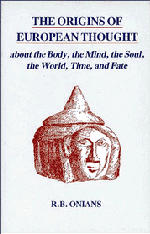Book contents
- Frontmatter
- Contents
- Preface to the first edition
- Preface to the second edition
- Introduction: The Earliest Greeks
- PART I THE MIND AND THE BODY
- PART II THE IMMORTAL SOUL AND THE BODY
- PART III FATE AND TIME
- Chapter I ‘On the Knees of the Gods’
- Chapter II Πείρατα
- Chapter III Καιρός
- Chapter IV The Weaving of Fate
- Chapter V Other Peoples—Fate and Magic
- Chapter VI Μοῖραν ἐπιτιθέναι, πεπρωμένος, etc.
- Chapter VII ʿΥπὲρ μόρον and the Relation of the Gods of Fate
- Chapter VIII The Jars of Zeus, the Scates of Zeus, and the Κῆρες
- Chapter IX Time—Ἦμαρ
- Chapter X Lachesis, Klotho, and Atropos
- Chapter XI Phases of Body and Mind, Sorrow, Sleep, Death, etc.
- Chapter XII Τέλος
- ADDENDA
- Indexes
Chapter I - ‘On the Knees of the Gods’
Published online by Cambridge University Press: 06 August 2010
- Frontmatter
- Contents
- Preface to the first edition
- Preface to the second edition
- Introduction: The Earliest Greeks
- PART I THE MIND AND THE BODY
- PART II THE IMMORTAL SOUL AND THE BODY
- PART III FATE AND TIME
- Chapter I ‘On the Knees of the Gods’
- Chapter II Πείρατα
- Chapter III Καιρός
- Chapter IV The Weaving of Fate
- Chapter V Other Peoples—Fate and Magic
- Chapter VI Μοῖραν ἐπιτιθέναι, πεπρωμένος, etc.
- Chapter VII ʿΥπὲρ μόρον and the Relation of the Gods of Fate
- Chapter VIII The Jars of Zeus, the Scates of Zeus, and the Κῆρες
- Chapter IX Time—Ἦμαρ
- Chapter X Lachesis, Klotho, and Atropos
- Chapter XI Phases of Body and Mind, Sorrow, Sleep, Death, etc.
- Chapter XII Τέλος
- ADDENDA
- Indexes
Summary
In Homer, one is struck by the fact that his heroes with all their magnificent vitality and activity feel themselves at every turn not free agents but passive instruments or victims of other powers. It was not merely that they and their foes ‘lived dangerously’ and life and fortune were precarious possessions. A man felt that he could not help his own actions. An idea, an emotion, an impulse came to him; he acted and presently rejoiced or lamented. Some god had inspired or blinded him. He prospered, then was poor, perhaps enslaved; he wasted away with disease, or died in battle. It was divinely ordained (θέσϕατον), his portion (αἶσα, μοĩρα) appointed long before. The prophet or diviner might discover it in advance; the plain man knew a little about omens and, merely seeing his shaft miss its mark or the enemy prevailing, concluded that Zeus had assigned defeat to himself and his comrades. He did not wait to fight further but fled. What are the details of this fatalism? A good deal is clear for him who runs to read—uses of αἶσα, μοĩρα, μόρος, μόρσιμον, ὑπὲρ μόρον, θέσϕατον, etc. But there are other expressions the significance of which lies deeper.
ταũτα θεῶν ἐν γούνασι κεĩται (Il. XVII, 514, XX, 435; Od. I, 267, 400, XVI, 129)— ‘It lies on the knees of the gods’. This famous phrase, still current, is a picturesque way of saying that some issue rests with a higher power whose will is not yet known.
- Type
- Chapter
- Information
- The Origins of European ThoughtAbout the Body, the Mind, the Soul, the World, Time and Fate, pp. 303 - 309Publisher: Cambridge University PressPrint publication year: 1988



